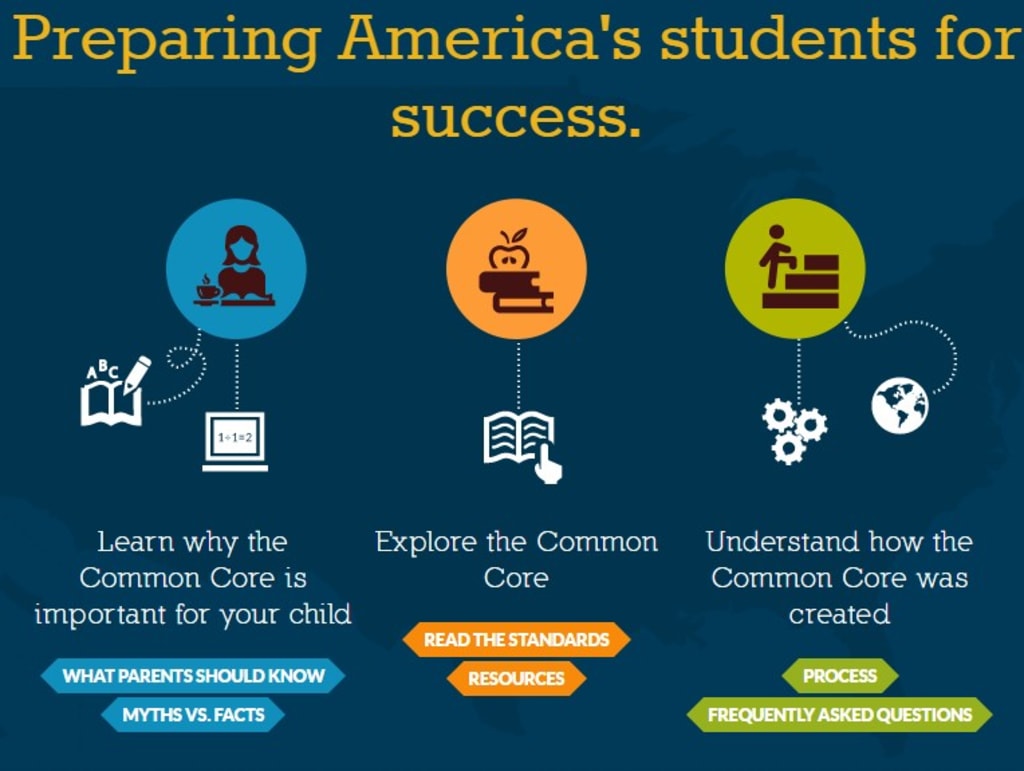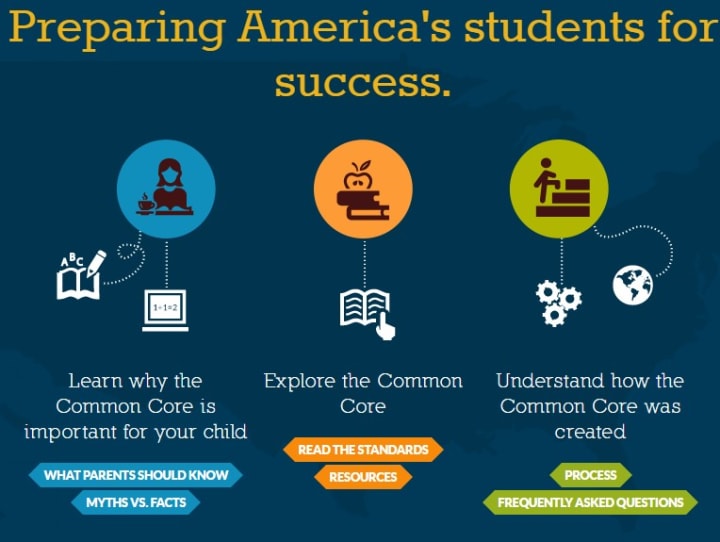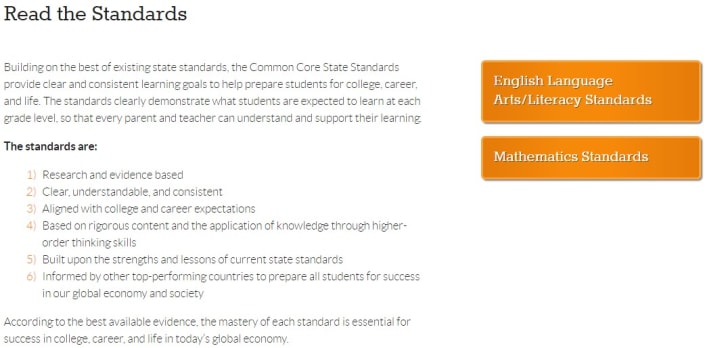Common Core is NOT the Problem
An Unpopular Opinion

It's everywhere nowadays, from parents throwing fits on Facebook to TikTokers bemoaning the current generation's lack of skills, and so on. They all have one complaint in common: "it's common core's fault."
Except.... it's not. Common Core is not the problem.
I got so annoyed by all these remarks that I took to TikTok myself and went on a five part rant about how Common Core is not to blame for why the current generation appears to have no skills, abilities, or general knowledge.
I recognize that most people going on these rants only have the most basic understanding of Common Core, i.e. what their student brings home in the form of school work and grades. The thing is... the Common Core standards are public and easily accessed by a quick internet search. So, why not take a look at them for yourself before blaming them?
Here, I'll help. The image below comes from the home page of CoreStandards.org and right there in the middle, under "Explore the Common Core" is a button to "Read the Standards".

Clicking that will take you to a page that explains what the standards are and how they came about. It also has two large buttons that you can click to read the standards specific to English and Math (Science and Social Studies are absent, because those are dealt with at a state level. Nationally, there is a heavy emphasis on English and Math, as those are the scores that are compared to other countries).

Clicking either one of those will take you to the actual Common Core standards that teachers work from. You can select a specific grade level to view those standards and see what students should know by the end of that grade level.
Now, I'm going to share with you my favorite standard to reference because this topic gets brought up a lot on social media as something "they just don't teach anymore because of common core".

Let me start by explaining the label at the top. CCSS stands for Common Core State Standards. MATH.CONTENT means this is a math standard that will be taught within a math curriculum or math block. 2 means this is a standard for 2nd Grade. MD.C means this is a Measurement & Data standard and the C indicates its the third part of the full Measurement & Data standards list. Finally, the 7 just means it's the seventh standard within the full Measurement & Data standards list.
Now, let's look at the standard: "Tell and write time from analog and digital clocks to the nearest five minutes, using a.m. and p.m." So, by the end of 2nd grade, students should be able to tell and write time from analog and digital clocks, and understand a.m. and p.m.
Here is irrefutable proof that students are taught to tell time from analog clocks, and yet everyone insists that students aren't taught it anymore because of Common Core. THIS IS A COMMON CORE STANDARD!
Forgive my yelling. It just really frustrates me.
Back to the point
As you can see, Common Core is not the problem. All Common Core does is explicitly state what students need to learn/know/master by the time they graduate. It doesn't say anything about how they are to learn these things.
The problem is not Common Core, but how we teach it.
At a national level, a "Common Core Aligned" curriculum was developed and for many public schools, that is what teachers are using to teach Common Core. There are a variety of Common Core Aligned curriculums out there, and while they are a great starting point, they are actually getting in the way of student success.
Unfortunately, the focus in many schools is demonstrating success on standardized tests. Administration believe that to do so requires strictly adhering to that aligned curriculum; but, that curriculum only focuses on one way to teach something.
Students don't all learn the same way.
So, strictly adhering to that curriculum is going to result in some students being unable to achieve success.
Teachers need the freedom to teach the Common Core standards in ways that ensures their students can master the standards, regardless of the curriculum.
Story Time
I was fortunate enough to work in a school that did not have a curriculum. There were no anthologies, no textbooks, nothing. We were told by our administration to look at the standards for our grade level and develop lessons to teach those standards.
We were given the freedom to teach to our students rather than teach to a standardized test. As a result, I saw my students have greater success with the content. My job was to give them the tools to be successful in whatever way worked best for them.
Take math for example. I had two rules: 1. You need to get the right answer, and 2. You need to be able to explain to me how you got your answer.
I didn't care how they did the math, so long as they could get the right answer and understood how they got that answer.
Standardized tests don't measure how a student learns the standards, nor do they measure how a teacher teaches the standards. All these tests can do is determine if the student got the answers right or wrong.
So, if that's all those tests can do... why are we so worried about teaching the standards the "right" way (i.e. the aligned curriculum way)?
The Bottom Line
If you're a teacher, and you don't have the freedom to teach in a way that's best for your students, speak up. You need to advocate for yourself as a teacher and for your students. The standards should only dictate what you teach, not how you teach it. Your students deserve a fair chance to be their best and learn in their best way, and you deserve the right to be the kind of teacher you want to be - one who helps her students be successful in their way and not based on some test.
If you're a parent or guardian of a student, I encourage you to go and read the standards. Take the time to understand what your student should be learning and what they should know. Learning doesn't just happen at school and it's important for you to take an active role in your student's education.
Going back to the Math standard about telling time. While it is taught in schools, it's taught in 2nd Grade and then doesn't get much repeated practice after that. It may show up from time to time on a test or in review, but it's not enough to keep that skill fresh. Repeated practice is important to helping students maintain their learning and knowledge. Unfortunately, teachers barely have the time to teach what they have to, so it's up to families to help provide repeated practice for those skills.
However, it's also important to remember that some of these skills just aren't as important as they once were. Children are growing up in a digital age and analog clocks aren't as common. Is the ability to read an analog clock important? I think so, and it's a good skill to have. Is it going to negatively impact a child's future success? Most likely not. Times are changing and what is considered an important skill has changed. Cursive has become typing, and telling time has gone digital.
Learning can happen anywhere, any time, and at any age. Take the time to learn the standards and if there's something you think your student really needs to know, take the time to teach it.
Just please, please, stop blaming Common Core.
This is a blog post from my blog Eagerly Engaged. I am an educator with a B.A. in Interdisciplinary Studies K-8 and am licensed to teach in 2 states.






Comments
There are no comments for this story
Be the first to respond and start the conversation.